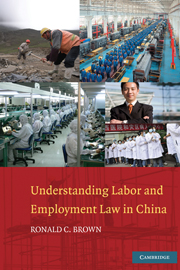Book contents
- Frontmatter
- Contents
- Preface
- Acknowledgments
- Understanding Labor and Employment Law in China
- PART I UNDERSTANDING CHINA'S REGULATION OF THE WORKPLACE
- PART II EMPLOYMENT RELATIONSHIPS
- PART III HIRING AND EMPLOYMENT PRACTICES
- PART IV WORKING CONDITIONS, WAGES, AND HOURS
- PART V EMPLOYEE BENEFITS: LEAVES, MEDICAL, MATERNITY, WORK-RELATED, UNEMPLOYMENT, AND PENSION INSURANCE
- PART VI DISCIPLINE AND TERMINATION UNDER EMPLOYMENT AGREEMENTS
- 12 Employer Work Rules, Discipline, and Termination
- 13 Restrictive Covenants: Employee Loyalty and the Employer's Protectable Interests
- 14 Resolving Labor Disputes by Mediation, Arbitration, and Litigation
- PART VII RIGHTS, REMEDIES, AND MULTIPLE FORUMS
- Appendix
- Index
- References
13 - Restrictive Covenants: Employee Loyalty and the Employer's Protectable Interests
Published online by Cambridge University Press: 22 January 2010
- Frontmatter
- Contents
- Preface
- Acknowledgments
- Understanding Labor and Employment Law in China
- PART I UNDERSTANDING CHINA'S REGULATION OF THE WORKPLACE
- PART II EMPLOYMENT RELATIONSHIPS
- PART III HIRING AND EMPLOYMENT PRACTICES
- PART IV WORKING CONDITIONS, WAGES, AND HOURS
- PART V EMPLOYEE BENEFITS: LEAVES, MEDICAL, MATERNITY, WORK-RELATED, UNEMPLOYMENT, AND PENSION INSURANCE
- PART VI DISCIPLINE AND TERMINATION UNDER EMPLOYMENT AGREEMENTS
- 12 Employer Work Rules, Discipline, and Termination
- 13 Restrictive Covenants: Employee Loyalty and the Employer's Protectable Interests
- 14 Resolving Labor Disputes by Mediation, Arbitration, and Litigation
- PART VII RIGHTS, REMEDIES, AND MULTIPLE FORUMS
- Appendix
- Index
- References
Summary
Legal Regulation
Traditionally in China, there has been no legally recognized duty of employee loyalty, though to be sure criminal limits existed, such as theft. With China's entry into a market economy came the development of employee mobility and private employers' interests in protecting confidential matters and restricting employees from moving to competitive companies; in response, by the early 1990s legislative protections for the employer began to be implemented. In 1994, the Labor Law authorized labor contract protections for “business secrets,” and more specific provisions followed both at the national and local levels. By 2006, laws clearly prohibited certain employees – “directors and senior management personnel” – from disclosing company secrets. In 2008, the LCL expanded on the Labor Law's protection of business secrets to allow more specific contractual protection of “confidentiality matters” relating to trade secrets and intellectual property and a restriction on competition for those workers who signed a confidentiality agreement.
However, there are limits on which employees and what interests may be legally restricted by contract. The LCL authorizes contract provisions restricting disclosure of confidential matters, such as trade secrets and intellectual property. Article 24 stipulates that competition restrictions may also be agreed to (compensation is required) and are limited to “senior management, senior technicians and other personnel with a confidentiality obligation.” Although this wording appears to limit competition restrictions to senior personnel, the LCL in Article 24 adds “and other personnel with a confidentiality obligation.
- Type
- Chapter
- Information
- Understanding Labor and Employment Law in China , pp. 163 - 167Publisher: Cambridge University PressPrint publication year: 2009



